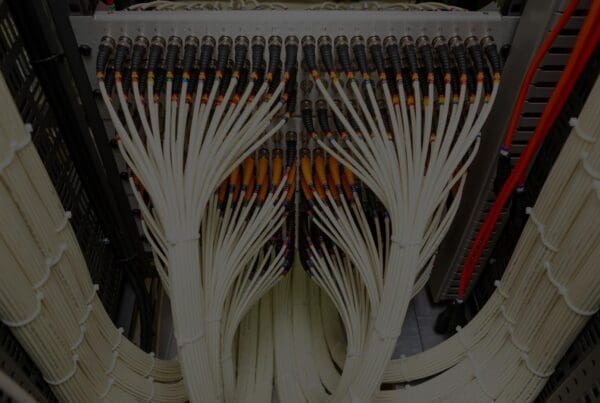In the dynamic field of Information and Communications Technology (ICT), a role that has gained significant prominence is that of a Structured Cabling Technician. A key player in implementing and maintaining the cabling systems that are the backbone of today’s telecommunication networks, their expertise contributes to the fluid operations of ICT infrastructures we depend upon daily.
However, when it comes to the earnings of a Structured Cabling Technician, one can observe a noticeable range in the UK sector. A prime influencing factor in a Structured Cabling Technician’s salary is their unique combination of skills and certifications. This post delves deep into this correlation, offering a comprehensive exploration of how professional skills and qualifications shape the salary of a Structured Cabling Technician.
As we uncover the importance of continuous learning and recognised certifications, this analysis presents an insightful guide to understanding and potentially enhancing the earning capacity in this indispensable and fast-evolving role.
The Role and Importance of a Structured Cabling Technician

A Structured Cabling Technician serves as a key pillar in the ICT industry. Their primary responsibilities revolve around the design, installation, and troubleshooting of structured cabling systems – crucial elements that interlink an organisation’s IT network, thereby enabling the seamless flow of data and communication.
Here are some significant tasks a Structured Cabling Technician performs:
- Conducting site surveys and drafting designs for new structured cabling installations.
- Handling the installation of diverse types of cabling, including Cat5, Cat6, and fibre optics.
- Identifying and rectifying issues within the cabling infrastructure, thus ensuring system stability.
- Adhering to relevant industry and safety standards for effective cable management.
- Collaborating with Structured Cabling Project Managers, other IT professionals, and key stakeholders to deliver optimised cabling solutions.
- This vital role in maintaining and advancing critical systems not only sustains our daily digital operations but also bolsters the development of new technologies and systems. Consequently, the demand for these professionals is on the rise, which directly impacts the Structured Cabling Technician salary in the UK. In the next section, we explore this aspect in more detail.
A Glimpse into the Structured Cabling Technician Salary in the UK

Understanding the financial aspect of a career path is as crucial as knowing the responsibilities it entails. When it comes to the Structured Cabling Technician salary in the UK, the numbers are quite intriguing.
- As of June 2023, the average salary for a Structured Cabling Technician in the UK stands around £33,488 per year, with a base pay of £29,816. This pay scale is particularly relevant for professionals based in the London area.
- On top of the base pay, a Structured Cabling Technician can expect additional earnings of approximately £3,671 annually. This additional pay comes in various forms, including cash bonuses, commissions, tips, and profit sharing.
- The total pay range varies significantly, spanning from £26,000 to £46,000. The breadth of this range reflects the variation in pay due to factors such as experience, skills, certifications, and the size and location of the employer.
- When we compare the Structured Cabling Technician salary with other roles in the ICT sector, we find that it sits comfortably in the median range, providing a competitive and sustainable income in today’s job market. In the upcoming sections, we’ll delve deeper into the factors that contribute to these variations in the Structured Cabling Technician salary.
The Influence of Skills and Certifications on the Structured Cabling Technician Salary

Developing a successful career as a Structured Cabling Technician involves more than merely securing a position – it necessitates ongoing skill enhancement and the pursuit of industry-recognised certifications. These factors can greatly impact the Structured Cabling Technician’s salary, shaping both the initial earning potential and prospects for future growth.
1. Technical Skills
A strong foundation in areas such as network design, installation and maintenance of structured cabling systems, troubleshooting, and knowledge of various cabling types is fundamental. Acquiring and demonstrating competency in these skills can lead to salary increases.
2. Industry Certifications
Attaining industry-specific certifications can boost the Structured Cabling Technician’s salary. Certifications verify the proficiency and commitment of technicians to their craft and are often seen as a mark of quality by employers. They can range from manufacturer-specific qualifications to broader industry-recognised credentials.
3. Specialisations
Further specialisations in areas such as fibre optics cabling, telecom systems, and office cabling can also contribute positively to a Structured Cabling Technician’s salary. Technicians who have diversified their skill sets through specialisation often enjoy higher pay scales.
Roadmap to Enhancing a Structured Cabling Technician Salary

Pursuing a career as a Structured Cabling Technician opens the door to a realm of opportunities for skill enhancement, learning, and salary growth. Here, we look at how continuous improvement and lifelong learning can substantially impact a Structured Cabling Technician’s salary.
1. Continuous Skill Improvement
Technicians should aim to keep abreast of the latest developments in the industry. This may involve learning about new cabling types, innovative installation methods, or upgraded testing equipment. Continuous skill improvement not only enhances your value as a professional but also positively influences your salary.
2. Valuable Certifications
Structured Cabling Technicians should consider acquiring industry-relevant certifications that could enhance their credibility and increase their earning potential. Certifications from recognised industry bodies or manufacturers can validate your skills, leading to career advancement and a boost in your Structured Cabling Technician’s salary.
3. Training and Courses
Various training programmes and courses offer insights into specific areas of structured cabling. Attending these courses can significantly improve your technical proficiency and offer practical insights that can help in your day-to-day job, ultimately leading to a better Structured Cabling Technician’s salary.
4. Exploring Opportunities
Technicians should also be open to exploring new opportunities in different sectors. Diverse experience can make you more versatile, improve your problem-solving abilities, and potentially lead to a higher Structured Cabling Technician’s salary.
Conclusion: The Value of Skills and Certifications to a Structured Cabling Technician’s Salary
As we have discussed throughout this post, the salary of a Structured Cabling Technician is not static; it’s a figure that a variety of factors can significantly influence. Among these, skills and certifications stand out as pivotal elements. The rapidly evolving ICT landscape demands that Structured Cabling Technicians constantly upgrade their skills and acquire relevant certifications to keep up with technological advances. This not only bolsters their value in the job market but directly correlates to a more competitive Structured Cabling Technician’s salary.
Maximise Your Structured Cabling Technician Salary with iCobus

If you’re a Structured Cabling Technician eager to enhance your career and salary potential, or an employer seeking skilled professionals for your ICT infrastructure projects, we invite you to connect with iCobus. With a wealth of industry knowledge and a wide network of opportunities, we can offer tailored guidance and resources to help you maximise the value of your skills and expertise in the structured cabling field.
Get in touch with our consultants today, and let’s build a connected future together.



